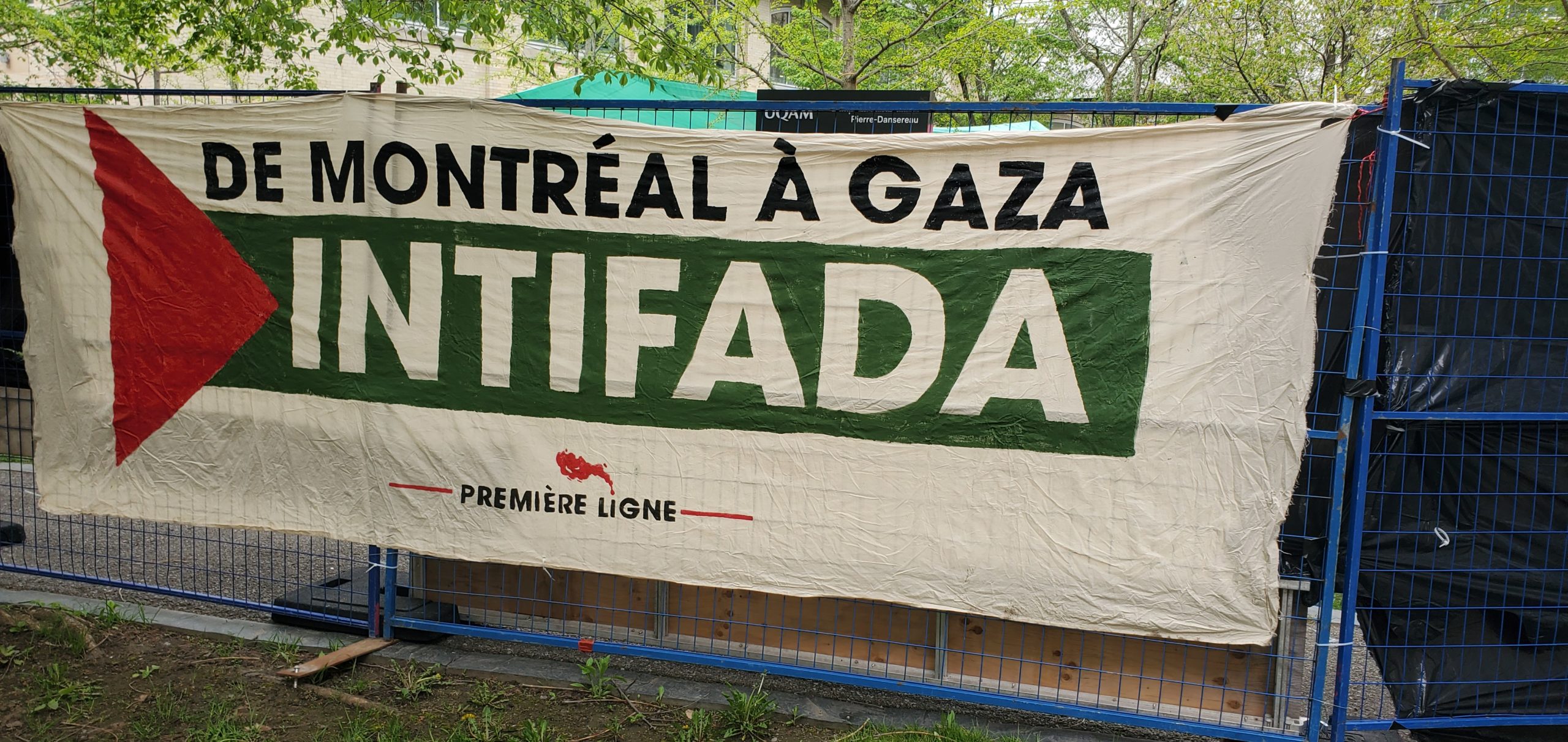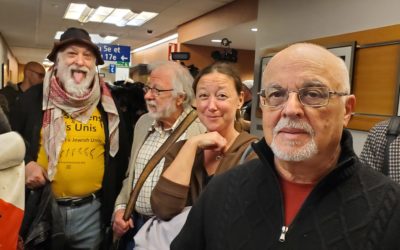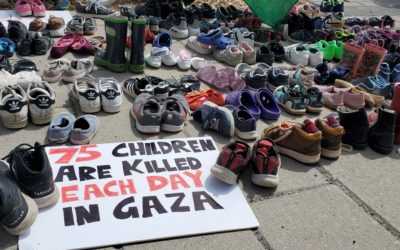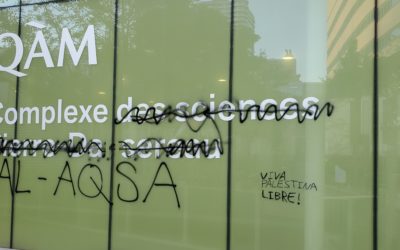This week, the Superior Court rejected a request for an injunction presented by McGill University to force the dismantling of the student encampment. For nearly a month now, students have been leading a peaceful protest encampment to demand that the University end its academic and financial ties with the Israeli genocidal regime. The action is part of an international protest movement on university campuses, in solidarity with Palestine and against the ongoing genocide.
The rejection of McGill’s request follows the rejection, two weeks ago, of another injunction request by two Zionist students (one of which is an ex IDF soldier) who alleged that the encampment was creating a hostile climate on campus. The Superior Court of Québec had concluded that the evidence presented did not prove that the demonstrations had created such a climate, nor that the Zionist students who had initiated the claim had been targeted by gestures and words that could make them fear for their safety. This time, then, it was the University itself that was getting impatient, annoyed by the persistence of a peaceful protest on a small portion of its grounds, facing Sherbrooke Street. In fact, the pile of tents occupies the space normally used for graduation and end-of-school-year ceremonies. According to McGill University, it’s a shame not to be able to use these grounds for quiet celebrations – while, for the past seven months, bombs have been raining down on Gaza, bombs and weapons that by all evidence are being developed with the support of university institutions, like McGill.
A growing coalition of groups stepped up to support the student encampment
When the request was filed on Friday, May 10th, 2024, McGill listed the defendants as “John Doe and Jane Doe” because, it argued, it has no idea who the protesters are. However, several groups involved in the encampment or who support it, including the Association of McGill Professors of Law (AMPL), the Students’ Society of McGill University (SSMU), Independent Jewish Voices (IJV) as well as Palestinian and Jewish Unity, requested intervener status and were accepted by the judge because some of their members are participating and involved in the encampment.
Serving as PAJU’s representative, renowned constitutional and human rights lawyer, Me Julius Grey said that “the right of freedom of expression and peaceful assembly must be given significant weight given the nature of the property. He added that a university cannot be compared “to someone’s house or living room.”
Students and civil society groups intend on continuing to support the brave students and campers who are standing up against genocide in Gaza committed at the hands of a corrupt and unstable Israeli government.
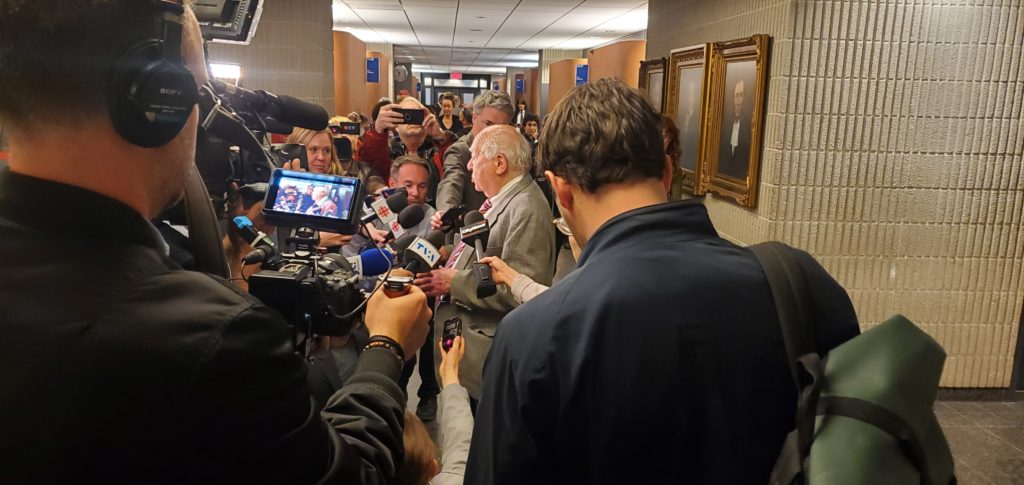
The encampments spread across Québec
In another show of solidarity, students from UQAM joined the movement by setting up another camp in the heart of the Montreal downtown core, at the UQAM Pavillon des Sciences on Sunday, May 12th. Even Innu student Xan Choquet joined the initiative. In an interview with APTN, the student said: “I think we have to realize as Indigenous people the importance of solidarity across different Indigenous nations,” said Choquet who is from Mashteuiatsh. “I want to remind people that Palestinians are Indigenous to their land. And they are going through a genocide. We are still in a genocide. We have gone through it.”
The group behind the encampment, Solidarité pour les droits Humains des Palestiniennes et Palestiniens (SDHPP-UQAM), demanded the withdrawal of McGill’s injunction request, an academic boycott against Israel from all Quebec universities, the public disclosure of all UQAM’s collaborations and links with Israel, full divestment from companies with ties to Israel and the abolition of the Quebec-Israel office.
Shortly after the initiative went viral on the news, in an email statement UQAM spokesperson Jenny Desrochers said that the university has no investments in weapons makers and has adopted a responsible investment policy, adding UQAM also has no student exchange agreements, or general agreements, with Israeli universities. Ironically, shortly after UQAM’s announcement, Paul Hirschson, Israel’s Consul General, said on X that he met more than once with the senior leadership of UQAM.
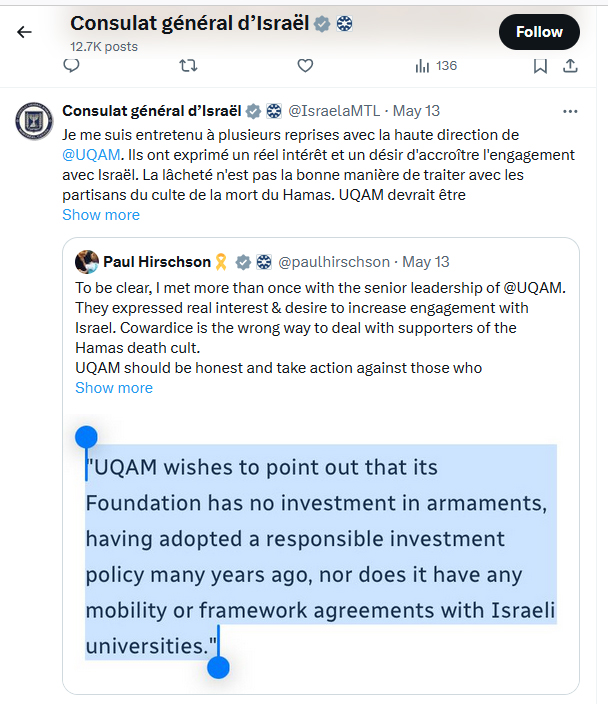
This is just one example for why students are demanding disclosure from their universities on collaboration and cooperation with the Israeli genocidal regime.
Only a few days after, students at Sherbrooke University also started a new encampment extending the call for solidarity with Gaza and the call for accountability on University Campuses on their collaboration with the Israeli genocidal regime.
Books not bombs, a worldwide call for divestment
On many university campuses across North America, war is closer than one might imagine. Universities invest billions of dollars in research and development for war machines. With the encampment initiatives, students and campers demand that their schools:
- publicize all investments;
- end any investments that support the Israeli military; and
- cut ties with the genocidal Israeli regime
Most universities so far say they cannot disclose investments. They say they have “no direct holdings” in Israeli wartime portfolios that would upset protesters. Most universities also further say that they will not take a “social or political” stance by ending investments in Israel.
As PAJU co-president Bruce Katz said: “Unfortunately, university administrations have always stood on the wrong side of history whether on Indigenous rights or the struggle against apartheid in South Africa. McGill University’s history is shameful and this time around, it’s not different. It takes the students, professors and civil society to be their moral compass.”
However, students by taking action on their campuses against genocide are reminding us that students and academics have power. Throughout history, they have stood at the forefront of political and social struggles. They have served as central catalysts in the fight for a better world that is more just.
Palestinian and Jewish Unity wishes to celebrate these achievements as well as encourage future ambitions. As students engage in this struggle for change, our greatest weakness, as supporters of Palestinian rights, would be not knowing our own strength and what we can do to encourage and build more solidarities. The reality is that the effectiveness of our voices is dependent on our ability to reconcile our differences and find common basis for action. Our strength is in numbers and the institutions know it.
As the situation in Palestine grows more dire by the hour, we as students, teachers, workers, doctors, bus drivers, nurses, business owners, musicians, writers and poets, we must remember the saying: ‘’When spiders unite, they can tie down a lion.’’ Time to unite. Free Free Palestine.
